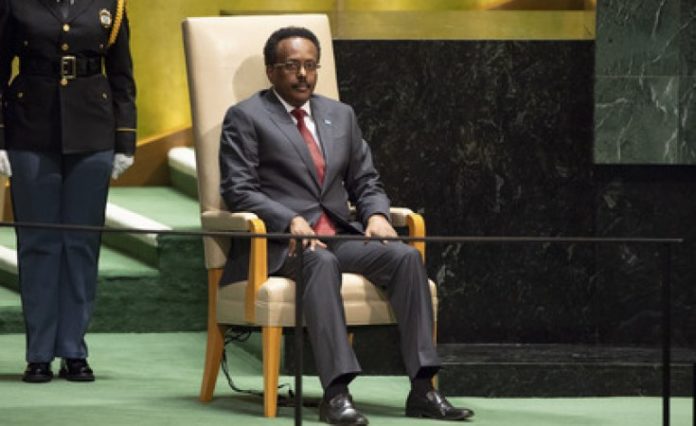Somalia President Mohamed Farmajo returns to Mogadishu to face the problem of whether to turn the capital into a federal state.
Days after he delivered his inaugural speech at the United Nations in which he called for international support to help Somalia rebuild “politics of inclusivity,” Mr Farmaajo may now have to manage the rising agitation on how the capital should be administered in future.
Those fronting the idea of granting autonomy to the capital region of Benadir argue that it could ensure local resources are used properly, away from the functions of the federal government.
LOCAL RESOURCES
Mr Abdulkadir Osoble Ali, the chairman Ileys Party in Somalia, argues the federal government of Somalia is diverting local resources to play national politics, leaving locals unattended.
“Somalia has 18 regions. Seventeen of those regions and their communities have elected their own leaders. The Benadir community has a right to elect theirs,” he told the Sunday Nation last week, referring to the region in which Mogadishu lies.
“Whether to turn it into a city state or otherwise should be a people’s choice. The people are ready to negotiate on an outcome that will benefit them, and one which will end this abuse we are seeing,” Mr Osoble, also the chairman of the House of the People’s Committee on Foreign Affairs and International Cooperation said.
Somalia currently has six federal states (although Somaliland is demanding to completely secede). Jubbaland, Hirshabelle, South West and Galmudug have all been created since federalism was proposed more than 10 years ago to calm perennial clan factions.
Under President Farmaajo’ s reign, each of these states has had a squabble with the federal government of Somalia (FGS), although nearly all political leaders agree Mogadishu should remain the national capital.
Somali researcher and analyst Abdimalik Abdullahi says the ultimate administration and how locals can benefit from it remains a political hot potato.
“The Benadir issue is complicated. It basically forms the core of the contentious issues that the Somali nation is struggling with. It will take political settlement to address such issues,” he told the Nation.
SPECIAL STATUS
“As usual, capital cities came along with a special status. The current provincial constitution reserves the demarcation of Mogadishu’s special status to the legislative organs. Political goodwill is also a prerequisite for Mogadishu’s special status to be figured out.”
Traditionally in the Benadir administrative region in southeastern Somalia, Mogadishu’s 17 districts have often been run under a mayor appointed by the federal government. Some politicians argue that this has made it difficult for local voices to be heard as the mayor’s longevity depends on relations with the federal government president.
“The people cannot decide who leads them or what their leaders should do. At the moment, they are at the mercy of the federal government, or sometimes al-Shabaab who tax them,” Mr Abdalla Ahmed Ibrahim, an executive member of Cahdi party, said.
“Benadir needs to allow local choices. This is missing,” he added.
Some have suggested that Benadir either merges with neighbouring regions of Middle Shabelle.
By Aggrey Mutambo






























